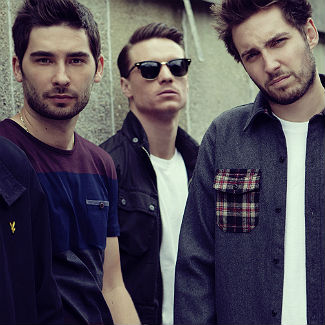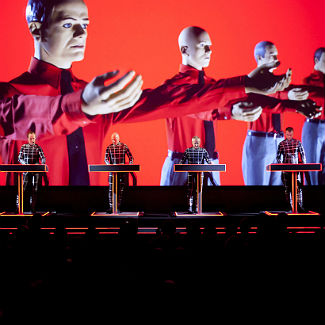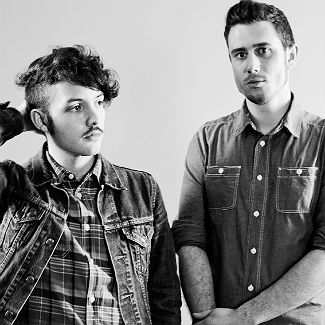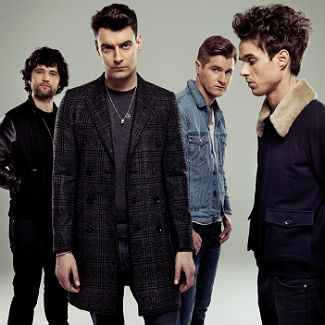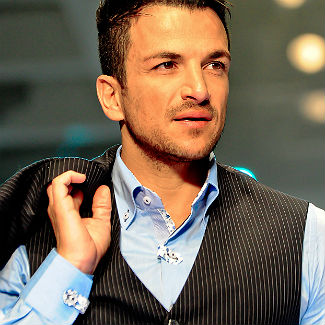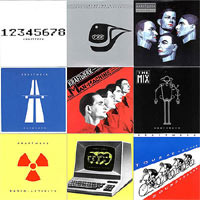
Photo:
To mark the 35th anniversary of the German electro pioneers’ landmark album ‘Autobahn’, Kraftwerk’s entire eight-CD catalogue is being remastered and reissued by Mute.
Think of German music today, and it’s easy to summarise what the country has to offer in terms of lazy stereotypes – pint-clutching oompah enthusiasts, denim & leather decorated metal heads, cheese-crusted techno-pop.
Follow the by-now faint tracks backwards some 40 years from the latter, however, and you’ll wind up somewhere immeasurably more interesting. Back in the early 1970’s, Germany momentarily became THE most happening place for groundbreaking, cliché-busting, forward-gazing sounds on the planet. The loose movement, with musicians linked together considerably more by geography and language than any shared musical aims, crudely referred to abroad as Krautrock, gifted the world many remarkable bands with genuine staying power. Even with acts as astonishingly original as Can and Neu! to boast of, Kraftwerk stand a (robot)head and shoulders taller than their peers in terms of the influence they’ve had on the development of genres that during the band’s Seventies heyday would’ve seemed impossibly futuristic, the stuff of wildly imaginative sci-fi fiction rather than actual forthcoming reality – to everyone but Kraftwerk’s visionary central duo Ralf Hütter and Florian Schneider, that is.
By crafting many of electronic music’s central building blocks, Kraftwerk’s early works led to the development of hip hop, electronica, techno and dance music as we know it. It’d also be argued that Kraftwerk’s bold visual ideas, particularly the way the band’s members gradually evolved from humans into robots towards the end of 70’s, pioneered the idea of a band as a comprehensive concept, with image and artwork at least as important as the music itself, the ramifications of which can be seen in vivid multicolour in every move made by the likes of Daft Punk. Cast a quick glance along the musical landscape, and you’ll see traces of Kraftwerk all over the shop, from the grand - LCD Soundsystem – to the bland (Coldplay, who recently sampled 1981’s ‘Computer Love’) - and the downright daft, in other words the kind of relentlessly upbeat, mid-European dance-pop that’s destined to always waft through the doors of lager-stained intoxication centrals.
Such widespread influence guarantees Kraftwerk’s place amongst the most important acts pop music’s ever managed to produce. But it’s quite commonplace to be a fearless pioneer, only for the more modern takes on the once-fresh templates to turn what once sounded startling in its innovation into a musty museum piece. Mute’s comprehensive Kraftwerk remastering programme that covers the eight albums the band produced between ‘Autobahn’ (1974) and ‘Tour de France Soundtracks’ (2003), available either as individual CDs or 8-CD boxset ‘The Catalogue’, proves classic Kraftwerk is in no danger of fading into irrelevancy anytime soon.
Assembled in the first incarnation of the band’s famed Dusseldorf studio Kling Klang with help from uber-producer Conny Plank, ‘Autobahn’ (****) isn’t actually Kraftwerk’s debut. Unlike its exploratory, largely improvised predecessors ‘Kraftwerk 1’, ‘Kraftwerk 2’ and ‘Ralf und Florian’, however, it provides the first full flowerings of the trademark Kraftwerk sound. Disciplined, mechanical and, barring the odd blast of Schneider’s flute, entirely electronic, the title track became a surprise hit on release, turning what could’ve been an obscure experimentation into a headline-grabbing concern. The marathon-length full version remains a head-spinning wonder, eclipsing everything else the album has to offer. Although not entirely devoid of reference points (the minimalism of the ‘motorik’ beats is reminiscent of Neu!, whose Klaus Dinger and Michael Rother were both briefly in Kraftwerk in the band’s very early stages), the paean to the most famous embodiment of Germany’s mass transport system packs an unmatched capacity to turn relentless repetition into hypnotic enchantment, with the ensuing warm pulse and simplistic melodies reminiscent of a bunch of androids tackling the girls and cars concept of vintage Beach Boys. The track’s 23-minute duration is enough to cross vast distances on the speed limitless German motorways. With it, Kraftwerk transported the listener several light years from Europe’s traumatic then-recent past into a clean, shimmering, hi-tech future.
Despite unveiling the classic Kraftwerk line-up of Hütter and Schneider with Karl Bartos and Wolfgang Flur, 1975’s ‘Radio-Activity’ (****) is often seen as a slightly disappointing follow-up to its groundbreaking predecessor. Not entirely without reason, as the album’s middle bits are burdened with some backfiring aural experiments. But the highlights – the way the intro’s steadily escalating Geiger counter clicks give way to the desolate drift of the superb, chillingly beautiful title track, and the deeply melancholy ‘Radioland’ – proved Kraftwerk were becoming more capable of expressing a vast scope of emotions on tools – synthesizers, electronic percussion, vocoders – that were often viewed as shorthand for inhuman, cold and distant produce.
By 1977, Kraftwerk had quit touring. The increased studio time is evident is the breathtaking brilliance of that year’s ‘Trans Europe Express’ (*****). In the much-celebrated year of punk and its supposed rulebook-shredding, the Dusseldorf four-piece truly had arrived at the musical year zero, a completely original, forebear-free sound not even on nodding terms with rock’s standard-issue guitar-shredding 1977’s most celebrated acts continued to adhere to.
From the compulsive, robotic groove of ‘Europe Endless’ to the soothing ambient glow of ‘Franz Schubert’, this is Kraftwerk’s masterpiece, the quartet’s increased ambition and confidence evident in the effortless excellence with which they execute both the comic but chilling electro-pop of ‘Showroom Dummies’ and the gloomy art-pop of ‘Hall of Mirrors’. Amazingly, the title track’s clattering ode to Europe-wide rail travel is miles better than all of the above, it’s sense of dynamics and economically administrated melodic hooks signposting the way hip hop tracks would be assembled, whilst the two modified version of the track’s central theme that follow showcase the central tenets of remixing, years before the term was coined. But you don’t have to be impressed by how far ahead of their time the band were to be in awe of ‘Trans Europe Express’. With or without historical importance, it remains a stunning record, as fresh today as it was on its day of release.
Perhaps unsurprisingly, Kraftwerk couldn’t quite scale these heights again. 1978’s ‘The Man-Machine’ (****) does come very close, though. Containing the band’s two best known tracks, the self-referential ‘The Robots’ and the still-vibrant smash hit ‘The Model’, the sleek, faultless if slightly chilly album marks the point where the band ceased to exist as actual human beings in public perception, opting instead to be portrayed as a four-headed, robotic entity – the title’s ‘man-machine’ – that remains the band’s best known incarnation, a development fully reflected in the relentless efficiency of the music, some of which was allegedly created by the band allowing the equipment assembled in Kling Klang to “jam” on its own, rescuing the best bits of the ensuing robot grooves for further development.
By 1981's 'Computer World’ (****) Kraftwerk’s once-unique, entirely electronic musical language had became more widespread, with the charts soon bustling with acts wishing to be perceived as androids from the distant future rather than normal human beings. It remains a fine album (‘Computer Love’, which perhaps unwittingly dreams up online dating several years before the dawn of the actual thing, is particularly brilliant), but some of the band’s mystique and pioneering zeal had by now evaporated, their music appearing for the first time to bear at least some relation to the what was going on in the mainstream.
The remaining records in ‘The Catalogue’ – 1986’s ‘Techno Pop’, 1991’s ‘The Mix’ and 2003’s ‘Tour De France Remixes’ – revisit past glories with varying degrees of success, and Kraftwerk – with only Ralf Hütter remaining of the hallowed quartet following Florian Schneider’s departure a few months ago - is by now much better known as a captivating live act than a creator of compelling new sounds (although an entirely new studio album is reportedly in the works). As such, Kraftwerk have come full circle – from breaking free of the past on their groundbreaking 70’s albums to becoming what is effectively an oldies act, albeit one whose revolutionary inventions remain too vital to ease into cosy nostalgia.
‘The Catalogue’ boxset out November 16. Remastered individual albums are out now.
